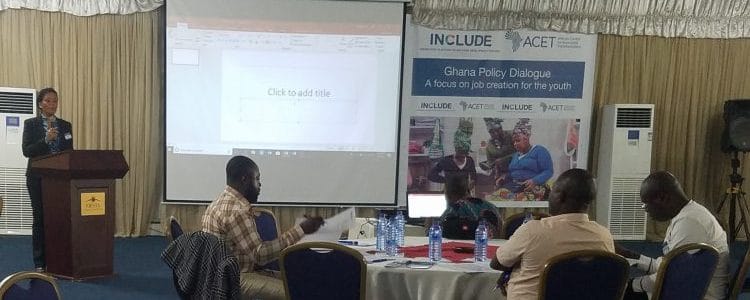
On 28 February 2018, the African Center for Economic Transformation (ACET), which is coordinating the African Policy Dialogues on job creation for youth in Ghana, held a national Policy Dialogue in Accra. The dialogue brought together key stakeholders concerned with addressing employment challenges including policymakers, members of the private sector, academics, development partners, members of youth networks, the media, employers’ associations and trade unions. The half-day dialogue consisted of introductory remarks, plenary and panel discussions, and question and answer sessions. The objective of the dialogue was to discuss sustainable solutions to youth employment challenges. The causes of unemployment and recommendations for job creation discussed at the dialogue are highlighted below.
Causes of unemployment
- Economic growth in Ghana has been driven by the extractive sector and financial services sector, which have low labour absorption. On the other hand, sectors that have high potential for employment creation such as agriculture, manufacturing and tourism have recorded low growth.
- There is a mismatch between the skill sets of those joining the labour market and labour market demands. This has resulted in increased unemployment among educated youth.
Recommendations for employment creation
- The government’s job creation interventions such as ‘One District, One Factory’ and ‘Planting for Food and Jobs’ should pay more attention to sectors that have high labour absorption capacity.
- To address constraints in the agricultural sector, the focus should be on appropriate policies and regulations, rather than merely initiating new programmes.
- Enhance skills development by ensuring that education and training systems focus on problem-solving, critical thinking, creativity and innovation skills to allow job-seekers to adapt to changing labour markets.
- Invest in the regular collection of employment and labour market data in order to ensure appropriate decisions are made, such as the setting of employment targets and monitoring of progress etc.
- Mainstream practical apprenticeship programmes and flexible employment policies to support new graduates.
- Intensify Science, Technology, Engineering and Mathematics (STEM) academic programmes at the basic level to boost the number of those taking the programmes at the university level.
You can find more on the dialogue held by ACET for Africa and INCLUDE on job creation for youth in the following news report by GH One TV (via Youtube):
Please accept marketing-cookies to watch this video.




